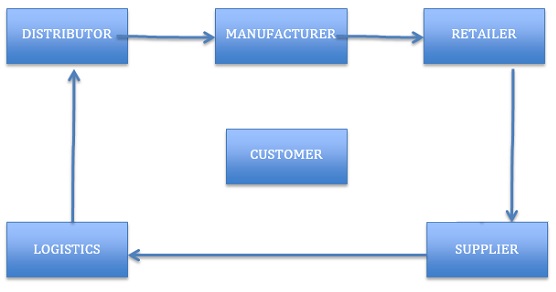- Business Concepts ›
- Operations and Supply Chain ›
- Supply Chain Management (SCM)
Supply Chain Management (SCM)
Definition & Importance
This article covers meaning & overview of Supply Chain Management (SCM) from operations perspective.
What is meant by Supply Chain Management (SCM)?
Supply chain management is the management of the flow of goods and services in order to deliver value to the end customer effectively along with optimising the process of delivering it. Supply chain management covers procurement of the raw materials, followed by production, inventory management, storage, warehousing and then transportation, logistics & distribution to the end consumer. The main reason to have Supply chain management is to create a flow of inventory that ensures greater availability and removal of surpluses.
Supply chain management not only deals with the physical flow of the products but also and importantly deals with the delivering of information related to this flow. Keith Oliver of Booz Allen Hamilton coined the term and focused its integration with operations management, production management and project management.
Importance of Supply Chain Management
Every business process is in place to deliver a good or a service to the end customer. Over the years as businesses have evolved and customer has become much more demanding. There is a need for proper management which manage this entire flow of goods and information from the manufacturer to the customer and vice versa. Here is where the role of supply chain management is very important.
SCM manages the entire flowby giving information at each point at end. A typical supply chain would have a manufacturer, a distributor, a wholesaler and a retailer. They all complete the supply chain. They all need information about inventory, quantity, shelf life etc at every point. The customer these days need information about the product even before the delivery. There are challenges to even reverse the flow if the customer doesn't like the product. This is also a kind of value of returning the product and refunding money. In all these flows, supply chain management is very important. There are multiple companies, people working in the same networked supply chain. It is very important to have supply chain management to be in place to make this cycle work all day or year long.
Over the years, supply chain has given rise to the concepts of re-engineering or reverse logistics. Most e-commerce players round the globe and almost all online retail uses the concept of reverse logistics.
In addition to this, supply chain has various global applications like:
• Global sourcing
• Raw materials from low cost providers
• Sharing of service centers
Supply Chain Management Flowchart

The above diagram represents how a customer is surrounded by the supply chain.
SCM is consolidated by the domains of operations management, logistics, procurement, and I.T. in an integrated approach, for highest efficiency and minimum losses.
Advantages of Supply Chain Management
SCM has several benefits which help and organization to grow. Some of them are listed below:
1. Supply chain management leads to higher efficiency in a business as all the processes are streamlined
2. SCM helps in managing the inventory better i.e. transportation, storage, warehousing, distribution etc
3. Good supply chain efficiency helps in managing timely deliverables
4. Costs are reduced significantly as SCM helps to eliminate wastage due to better processes
5. Overall profitability increases and business partnerships are strengthened
6. Better delivery, higher customer satisfaction, transparency in processes are other benefits
Hence, these are some of the advantages of having supply chain management in your business
Disadvantages of Supply Chain Management
Despite many benefits, there are certain disadvantages as well, which are shared below:
1. Sometimes supply chain management becomes too complex to understand and causes business hindrances because of extra processes
2. Things like buffer stock, additional manpower & planning etc cost more to the company
3. Geographic limitations in terms of warehouses, storage etc
Hence, this concludes the definition of Supply Chain Management (SCM) along with its overview.
This article has been researched & authored by the Business Concepts Team which comprises of MBA students, management professionals, and industry experts. It has been reviewed & published by the MBA Skool Team. The content on MBA Skool has been created for educational & academic purpose only.
Browse the definition and meaning of more similar terms. The Management Dictionary covers over 1800 business concepts from 5 categories.
Continue Reading:
What is MBA Skool?About Us
MBA Skool is a Knowledge Resource for Management Students, Aspirants & Professionals.
Business Courses
Quizzes & Skills
Quizzes test your expertise in business and Skill tests evaluate your management traits
Related Content
All Business Sections
Write for Us